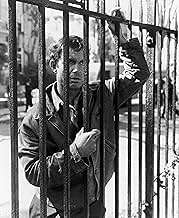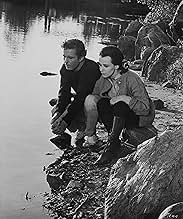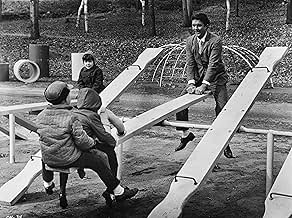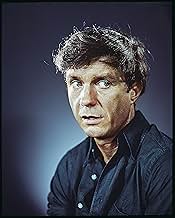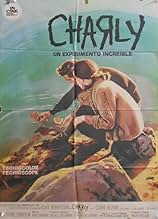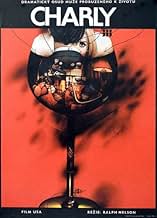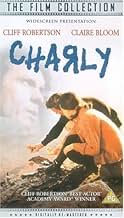IMDb रेटिंग
6.9/10
7.6 हज़ार
आपकी रेटिंग
अपनी भाषा में प्लॉट जोड़ेंAn intellectually disabled man undergoes an experiment that gives him the intelligence of a genius.An intellectually disabled man undergoes an experiment that gives him the intelligence of a genius.An intellectually disabled man undergoes an experiment that gives him the intelligence of a genius.
- 1 ऑस्कर जीते
- 4 जीत और कुल 6 नामांकन
Dick Van Patten
- Bert
- (as Richard Van Patten)
Edward McNally
- Gimpy
- (as Skipper McNally)
Marianna Case
- Young Woman
- (बिना क्रेडिट के)
Leon Collins
- Tap Dancer
- (बिना क्रेडिट के)
Harry Cooper
- Conference Attendee
- (बिना क्रेडिट के)
Frank Dolan
- Eddie
- (बिना क्रेडिट के)
Randee Lynne Jensen
- Extra
- (बिना क्रेडिट के)
Ralph Nelson
- Convention Speaker
- (बिना क्रेडिट के)
Donald Warnock
- Conference Attendee
- (बिना क्रेडिट के)
फ़ीचर्ड समीक्षाएं
Charly is a very touching sci-fi film about a retarded man Charly Gordon (Cliff Robertson) who can barely perform the menial job of sweeping up in a bakery and is the continual butt of jokes and ridicule by the bakers. He is chosen to participate in an experiment and is given treatments to boost his IQ. Alice Kinninan (Claire Bloom) plays one of the scientists who helps Charly to learn. Charly is based on the story Flowers For Algernon and the screenplay was by Stirling Silliphant (In The Heat of the Night.) Cliff Robertson won a best actor Oscar for Charly. The film is intelligent, poignant, and extremely moving. You'll need a box a Kleenex with your popcorn for this one.
Before there was "Awakenings" (1990) and "Good Will Hunting" (1997), there was a sincere, sad, and bittersweet film called "Charly" (1968). The film is based on the book "The Two Worlds of Charly Gordon." Cliff Robertson delivers a brilliant performance as a mentally retarded man who becomes a genius through scientific experiments. Claire Bloom is Charly's social worker (and love interest). The film is directed by Ralph Nelson ("Lillies of the Field"). score: 8 (out of 10).
A mildly mentally retarded man submits to a scientific experiment to increase his intelligence. Like "Frankenstein", "Charly" is a clever morality play about science that crosses certain boundaries. Unlike "Frankenstein", which took the horror route, "Charly" explores the emotional human tragedy that inevitably occurs when an experiment of this nature goes awry.
Many scientists back then and even today argue that the professional boundaries that were crossed in this story would never happen in real life. Yet with the recent successful gene manipulation and cloning experiments many believe it is only a matter of time, a very short time, before a human submits to such experiments.
The movie, of course, is not this clinical. Based on the classic novel, "Flowers for Algernon", the movie strikes a keen balance of warmth, comedy and tragedy. Cliff Robertson's fascinating portrayal of the main character is unforgettable. His delivery of the powerful speech at the scientific convention is just as stunning and eerily accurate today as it was over thirty years ago.
An emotional, touching drama, "Charley" still rings a cautionary bell. One that should be heard and not ignored as we enter the new millennium.
Many scientists back then and even today argue that the professional boundaries that were crossed in this story would never happen in real life. Yet with the recent successful gene manipulation and cloning experiments many believe it is only a matter of time, a very short time, before a human submits to such experiments.
The movie, of course, is not this clinical. Based on the classic novel, "Flowers for Algernon", the movie strikes a keen balance of warmth, comedy and tragedy. Cliff Robertson's fascinating portrayal of the main character is unforgettable. His delivery of the powerful speech at the scientific convention is just as stunning and eerily accurate today as it was over thirty years ago.
An emotional, touching drama, "Charley" still rings a cautionary bell. One that should be heard and not ignored as we enter the new millennium.
10JDFeltz
I saw this movie at the drive-in when I was 12. I recall finding it to be a touching tragedy. I used to volunteer with "the special ed class", and found the students there to be gentle and grateful and affectionate, and could never understand how the other kids could make fun of them the way they did. But that only explains how and why this touched me personally, even at the age of 12.
Reviews some 30 years after this film was made are very critical, calling it 'schlock', and criticizing the simplification of a complex issue. However, over the last 30-40 years, society has become more enlightened about both mental retardation, but also about what science can and cannot do. It was easier to suspend belief and go with the concept.
At the time, this movie conveyed something new about how a mentally retarded person might view their situation....that alone made this film unique; lots of people never even considered the feelings of the mentally retarded, so this film surely opened some eyes.
And way ahead of it's time (I'm sure this was never considered in making the film), because it conveys the feelings and reactions of someone who is losing their intellectual capacity....such as those suffering from dementia or Alzheimer's. At that time, little thought was given by the average person about the feelings of either the mentally retarded, or people with Alzheimer's or dementia.
I'm sure the book was better than the movie; that almost always goes without saying. However, movies reach audiences that books sometimes don't, and this movie reached a new audience.
I'm afraid too many reviewers are unable to see an older movie and not hold it to the same standards, socially, scientifically and a cinematography standpoint. Cinema has evolved, as has society and science, and it's quite interesting to watch "Charly" with that in mind.
Reviews some 30 years after this film was made are very critical, calling it 'schlock', and criticizing the simplification of a complex issue. However, over the last 30-40 years, society has become more enlightened about both mental retardation, but also about what science can and cannot do. It was easier to suspend belief and go with the concept.
At the time, this movie conveyed something new about how a mentally retarded person might view their situation....that alone made this film unique; lots of people never even considered the feelings of the mentally retarded, so this film surely opened some eyes.
And way ahead of it's time (I'm sure this was never considered in making the film), because it conveys the feelings and reactions of someone who is losing their intellectual capacity....such as those suffering from dementia or Alzheimer's. At that time, little thought was given by the average person about the feelings of either the mentally retarded, or people with Alzheimer's or dementia.
I'm sure the book was better than the movie; that almost always goes without saying. However, movies reach audiences that books sometimes don't, and this movie reached a new audience.
I'm afraid too many reviewers are unable to see an older movie and not hold it to the same standards, socially, scientifically and a cinematography standpoint. Cinema has evolved, as has society and science, and it's quite interesting to watch "Charly" with that in mind.
The film is wonderful in many aspects. The acting is first-rate; Oscars usually aren't handed out on a whim. Cliff Robertson delivered the performance of his career in this film.
There are elements of science fiction and psychological action in the film. You have been warned. These segments are well done and add to the film as opposed to creating a negative side-track.
I suggest that anyone watching Charly first read at least part of Daniel Keyes's "Flowers for Algernon" for basic background. The film makes more sense after reading the novel.
All in all, Charly is a worthwhile experience. Some may not like the film, but I find it to be one of the best of the 1960s.
There are elements of science fiction and psychological action in the film. You have been warned. These segments are well done and add to the film as opposed to creating a negative side-track.
I suggest that anyone watching Charly first read at least part of Daniel Keyes's "Flowers for Algernon" for basic background. The film makes more sense after reading the novel.
All in all, Charly is a worthwhile experience. Some may not like the film, but I find it to be one of the best of the 1960s.
क्या आपको पता है
- ट्रिवियाAfter the operation, when Charly loses his temper over being beaten once again by the mouse, no one seems to notice that he is now pronouncing Algernon's name with the first N included, instead of his previous "Algeron" with the missing N.
- गूफ़When Charly is talking to Mrs. Kinnian outside the building for his night class, he's wearing a gold vest. When the camera cuts back to him after Mrs. Kinnian enters her car, he's wearing a blue vest.
- भाव
Charly Gordon: I was wondering why the people who would never dream of laughing at a blind or a crippled man would laugh at a moron?
- क्रेज़ी क्रेडिटThe title appears onscreen as if scrawled by a child, with the "R" backwards.
- कनेक्शनFeatured in The 70th Annual Academy Awards (1998)
टॉप पसंद
रेटिंग देने के लिए साइन-इन करें और वैयक्तिकृत सुझावों के लिए वॉचलिस्ट करें
- How long is Charly?Alexa द्वारा संचालित
- Isn't the movie 'Charly' actually based on 'Flowers for Algernon' by Daniel Keyes?
विवरण
- रिलीज़ की तारीख़
- कंट्री ऑफ़ ओरिजिन
- भाषा
- इस रूप में भी जाना जाता है
- The Two Worlds of Charly Gordon
- फ़िल्माने की जगहें
- उत्पादन कंपनियां
- IMDbPro पर और कंपनी क्रेडिट देखें
बॉक्स ऑफ़िस
- US और कनाडा में सकल
- $1,58,26,800
- दुनिया भर में सकल
- $1,85,30,000
इस पेज में योगदान दें
किसी बदलाव का सुझाव दें या अनुपलब्ध कॉन्टेंट जोड़ें


